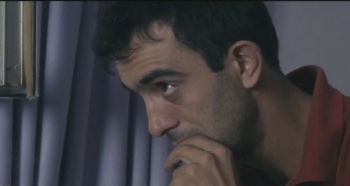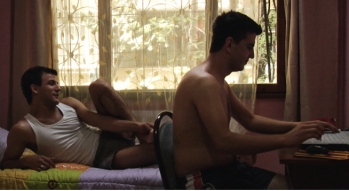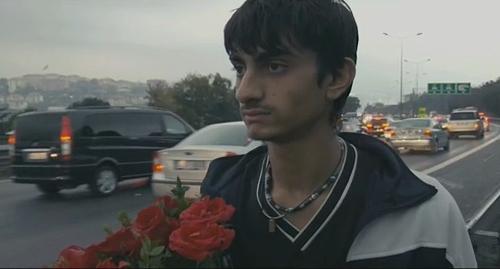As a child I lived for a while near the footings in Ortaköy of the Bosphorus Bridge, which was being constructed over the breathtaking straits of Istanbul. Our life as oil expatriates was many worlds away from the skinny hawkers, whistling traffic cops and sweating construction workers whom our car passed every day. Four decades later this magnificent bridge has brought a global political metaphor, an entire little commercial ecosystem, and a raft of deeply affecting human existences.
Men on the Bridge, Asli Özge’s film which has been picking up awards on the foreign festivals circuit recently, isn’t about the construction workers but about three men for whom today the great bridge has become their place of work: an illiterate young rose hawker, an optimistic traffic cop and a hopeless cab driver. Originally planned by Özge as a documentary about modern Turkey, it forcefully straddles documentary and fictional soap-opera suspense, as these characters are real people who really do work there. Only one of the three, the policeman, isn’t played by himself (due to Turkish regulations about police moonlighting on film) - his brother stands in. But the script is a script, though you wouldn’t guess it.
 What we get is an absorbing and uncalculated trio of stories of young men who must pass by each other unwittingly every single day on those eight traffic-choked lanes. Unemotionally, and yet with a disconcerting candour, Özge films the cabbie’s wretched domestic conversations with his wife Cemile, who dreams of villas and sparkly shoes, while Umut works 24 hours at a stretch driving a beat-up dolmush, coming home too beat to argue, let alone change his life. He’s 28 but looks 48, so haggard is he. His boss tells him, “Hit her. You’re a man, aren’t you? Women only understand a good slap.” Umut, fortified, goes home and commands Cemile to reheat his soup. She says no. The soup stays cold. She is eminently slappable, but ye gods, he’s a misery (Umut Ilker pictured right).
What we get is an absorbing and uncalculated trio of stories of young men who must pass by each other unwittingly every single day on those eight traffic-choked lanes. Unemotionally, and yet with a disconcerting candour, Özge films the cabbie’s wretched domestic conversations with his wife Cemile, who dreams of villas and sparkly shoes, while Umut works 24 hours at a stretch driving a beat-up dolmush, coming home too beat to argue, let alone change his life. He’s 28 but looks 48, so haggard is he. His boss tells him, “Hit her. You’re a man, aren’t you? Women only understand a good slap.” Umut, fortified, goes home and commands Cemile to reheat his soup. She says no. The soup stays cold. She is eminently slappable, but ye gods, he’s a misery (Umut Ilker pictured right).
Murat the traffic cop is uneasily aware that he is too much a modern wimp for the girls he meets on internet dating (Murat Tokgöz pictured below with his cop colleague). The movie might almost be titled “Women on the Bridge”, since the subtext is as much about the unshiftable Eastern ballast in Turkish girls’ make-up as about the Western direction of the men. Murat’s dates wait slyly for him to take the lead in their conversation - one of them swiftly gets onto the small size of his pay packet, and suddenly remembers another appointment. The other starts more promisingly, discussing family backgrounds, but alas, Murat doesn’t know when to stop bragging about ancient Arab bloodlines in Kayseri, and she starts drumming her fingers.
 Yet when he mentions he’s soon to be posted to the east of the country, and then you see him anxiously watching on TV the news of a lethal PKK terrorist attack in eastern Turkey, 16 Turkish soldiers dead, you feel for this amiable, conciliatory young man. With his mobile, expressive face and chubby smile, Tokgöz is the antithesis of the gaunt, shut-in Umut Ilker. He's aeons away from Midnight Express.
Yet when he mentions he’s soon to be posted to the east of the country, and then you see him anxiously watching on TV the news of a lethal PKK terrorist attack in eastern Turkey, 16 Turkish soldiers dead, you feel for this amiable, conciliatory young man. With his mobile, expressive face and chubby smile, Tokgöz is the antithesis of the gaunt, shut-in Umut Ilker. He's aeons away from Midnight Express.
Fikret Portakal’s is the most heartrending tale. This unattractive, mumbling 17-year-old with awful teeth and threadbare clothes has never been to school - he says he taught himself to read the names of the horses on TV racing - and lives (if that's the word) in the filthiest of slums on the edge of Istanbul. This lad is so low it hurts to watch, but even more to look away. He ambles to the bridge each day, blankly thrusting improbable bunches of wilting red roses at the thronging drivers. He’s a traffic nuisance, just as the haughty congressman’s daughter who holds up traffic while using her mobile is. In a smart vignette of Istanbul’s ties between modern and ancient, she glares furiously at the cop while she’s chatting to her girlfriend, and snaps, like a Sultana about to order an execution, “Do you know who I am?”
All around their compelling personal situations Özge weaves the bigger picture of a modern Turkey both bridging West and East and also split between them, the secular country with the Muslim culture, the EU hopeful with an enormous education problem. He even films inside a mosque, where the imam gives a sermon apparently advocating equal access for women. After the businessman advising a good slap for the wife, the imam preaching feminism makes a very diverting complement, though possibly not something to read too much into. But it is truly alarming to hear shiftless, miserable Fikret and his street-rat friends saying enviously, as they watch tanks parade on Republic Day, “I wish we had a war.” In this horrendously neglected sector of Istanbul’s urban hordes a cause, something to do, something to be needed for, would be a match easily ignited.
The bridge itself beckons like a shimmering casket of promise - at night-time Özge and his director of photography, Emre Erkmen, make it look like the Milky Way, streaming with pinpoints of white light, a heavenly path hovering between the jewels of the East and the lures of the West, Turkish flags and US dollars. It's a no-man's-land, and no wonder Fikret belongs there. The line that sticks in the mind is the street boys shouting with the nationalistic, flag-waving crowds: "All for the Motherland!" and Fikret muttering bitterly, "Right! And you for us!" This is a quietly shocking film.
- Men on the Bridge goes on general release today
- The Men on the Bridge official website
Watch the official trailer for Men on the Bridge below















Add comment